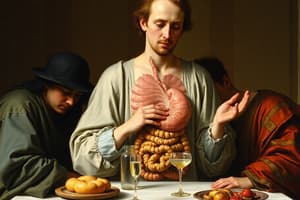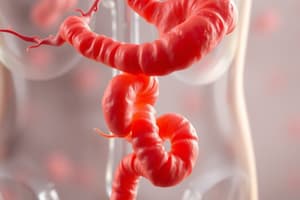Podcast
Questions and Answers
What is a hormone?
What is a hormone?
A substance produced by one set of cells that travels through the blood and affects another set of cells.
What stimulates the secretion of gastrin?
What stimulates the secretion of gastrin?
A rich protein meal.
What does secretin stimulate in the pancreas?
What does secretin stimulate in the pancreas?
The release of digestive enzymes and bicarbonate (HCO3-).
What triggers the release of cholecystokinin (CCK)?
What triggers the release of cholecystokinin (CCK)?
Which of the following is NOT a function of the liver?
Which of the following is NOT a function of the liver?
What does the pancreas produce?
What does the pancreas produce?
What is the hepatic portal vein responsible for?
What is the hepatic portal vein responsible for?
BMR stands for ______.
BMR stands for ______.
Flashcards are hidden until you start studying
Study Notes
Control of Digestive Gland Secretion by Hormones
- Hormones are chemical messengers produced by one set of cells, travel through the blood, and affect another set of cells.
Gastrin
- Gastrin is a hormone produced by the lower part of the stomach in response to a rich protein meal.
- Gastrin travels through the blood to the upper stomach, where it binds to receptors on gastric cells.
- Gastrin stimulates gastric cells to release gastric juice, which contains hydrochloric acid (HCl) and pepsinogen.
- HCl helps to break down proteins, while pepsinogen is converted to pepsin, an enzyme that also breaks down proteins.
Secretin
- Secretin is a hormone produced by the wall of the duodenum in response to acidic chyme entering the small intestine.
- Secretin travels through the blood to the pancreas, where it stimulates the release of digestive enzymes and bicarbonate ions.
- Bicarbonate ions neutralize the acidic chyme, while the digestive enzymes further break down food.
Cholecystokinin (CCK)
- CCK is a hormone produced by the wall of the duodenum in response to the presence of fats and proteins entering the small intestine.
- CCK travels through the blood to the pancreas and gallbladder.
- CCK stimulates the pancreas to release digestive enzymes, and it also causes the gallbladder to contract, releasing bile into the duodenum.
Accessory Organs or Glands
- The pancreas produces bicarbonate ions, digestive enzymes, and hormones like insulin and glucagon.
- Insulin allows cells to take up glucose from the blood, lowering blood sugar levels.
- Glucagon stimulates the liver and muscles to undergo gluconeogenesis, converting glycogen into glucose.
Liver Function
- The liver has many essential functions:
- Destroys old red blood cells
- Produces bile, which is stored in the gallbladder
- Stores glucose as glycogen
- Produces urea from amino acid breakdown through deamination
- Makes blood proteins like albumin, which increases osmotic pressure in the blood
- Detoxifies the blood
Hepatic Portal Vein
- Blood vessels that pick up absorbed nutrients and toxins funnel into the hepatic portal vein.
- The hepatic portal vein carries these substances to the liver for processing.
Basal Metabolic Rate (BMR)
- BMR is the lowest amount of energy needed by the body to stay alive.
Studying That Suits You
Use AI to generate personalized quizzes and flashcards to suit your learning preferences.




